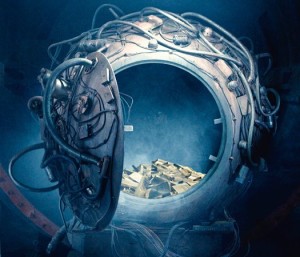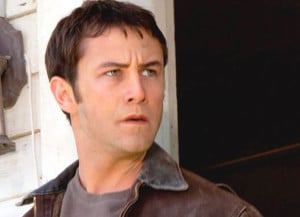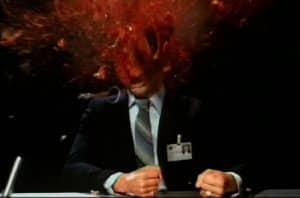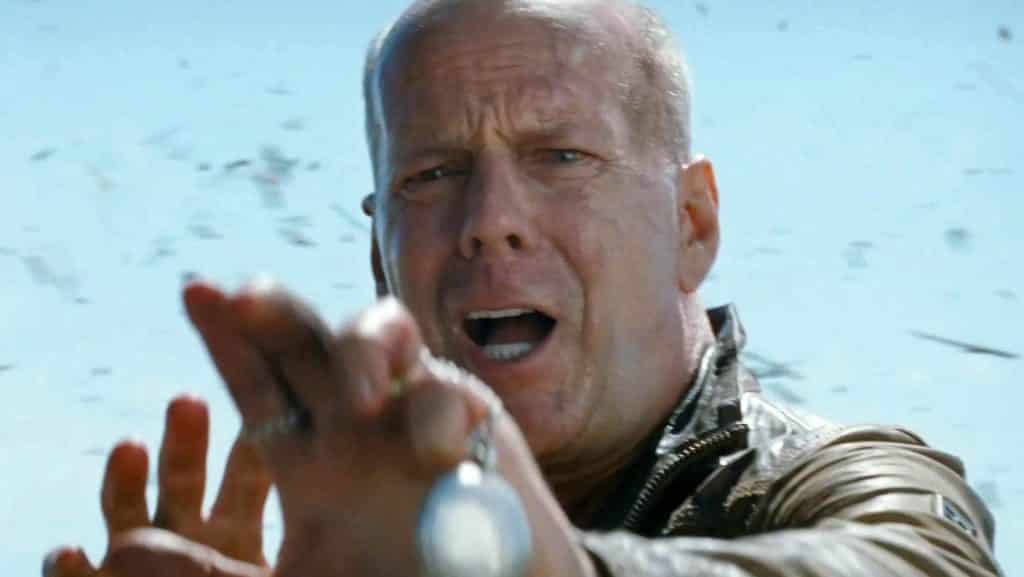
Looper is heralded as one of the best science fiction movies in recent memory. And it has a lot going for it. Chief among them is the fact that it’s one of the few completely original sci-fi flicks. No adaptation. It also does a great job accomplishing what sci-fi excels at: a morality play obscured by INSERT FUTURE TECH HERE. But 10 Looper plot holes undercut everything it does well.
Time travel is a tricky thing. The only example I can point to of a time travel plot that has no serious holes is Primer, but that was written by a math genius (who apparently was called in to help with Looper) who took his time to craft a perfect plot. Rian Johnson goes so far, in interviews and the actual dialogue of the film, to state he didn’t want to put an emphasis on time travel. His goal was the story.
These Looper plot holes are pretty gaping, even more so than Terminator. Beyond just the time-related paradoxes, it contains other logic problems that, when examined, make the entire movie seem a little goofy. Though the film hits the mark on some emotional fronts, it’d be foolish for fans to entirely overlook the paradoxes in Looper.
WARNING: Everything beyond this point will contain massive, gigantic, movie-ruining spoilers. The most ruinous ones (involving game-changing time paradoxes) are put near the end to protect you from scroll-happy impulses because they are the climaxes of the film. This movie is worth seeing without being spoiled, so please bookmark this and return later if you have not seen the movie but have plans to see it.
10 Looper plot holes
1. World’s laziest Mafia sets time travel machine on auto
Early on, we see how the older version of Joe (Bruce Willis) breaks free of his captors and decides to run into the old-timey submarine hatch that is apparently what a time travel device looks like, thus relieving himself of the usual hood and handties that hinder other victims. He wants to save his wife by changing the past, so it’s not such a bad proposition to jump in.

But the machine whirs to life and sends him back after closing the door. This seems like a bit of a design flaw. Does anyone who wonders in off the street into the wide-open warehouse have carte blanche to this time machine as long as they remember to shut the door behind them? Well, maybe the mobsters got it running beforehand, but we only see the two henchmen, and they’re seen entering with their hands full carrying old Joe. If there was an operator standing off screen, you’d think he’d jump in when the captive gets the upper hand.
Well, maybe they came in, got it running, then went out and grabbed him from the trunk or something. Still, why not have a big red button you have to push to actually activate the time travel? Imagine if your car started the minute you closed the driver-side door. Or, if you had it running already, it popped the gear out of park and into reverse… I’d buy a new car.
2. TKs are the future’s equivalent of guitar-playing douchebags
Ten percent of the population has the TK gene, which grants them telekinetic powers. Joe (Joseph-Gordon Levitt), via voiceover narrative, explains that when the phenomenon was discovered it was a global sensation. “Everyone thought we’d get superpowers,” Joe says. But, soon it became clear that the power was useful for little more than floating quarters at parties to impress girls.
Well, no, Joe. Ten percent of the Earth’s population did get superpowers.
Okay, so not everyone is Yoda, and size apparently matters. But this is a world changing event. Nothing would ever be the same.
Telekinesis would imply a change in everything we know about physics. Where is the equal and opposite force from this coin floating? It would mean there is some kind of field connecting everything, and that force could be controlled by your mind. It couldn’t be electromagnetism, because even if you could somehow explain the brain as a series of electric pulses, there’s still a skull and a few feet of air between that brain and the coin. Every scientist not working on Cancer would stop what they were doing and immediately try to figure this out.
Because the answers gained would solve every energy problem known to man. Electricity would be yesterday’s news. Right now we use mechanical energy, or nuclear energy, to convert to usable energy. It’s caused a problem known as entropy, which promises to bring the universe to a halt in trillions of years and freeze all of existence. Well, no worries. Because this is a no-lose proposition. If nothing else, set a TK dude up with a nice, comfy chair and have him slowly spin a little handle connected to a series of gears that produce the electricity. Get a line of the dudes, pay them $9 per hour, and you have the cheapest electrical plant ever known.
Oh, and space travel. We’d be interstellar within weeks.
Space is a vacuum. Up there, you don’t weigh anything. But the problem with going to Mars or Pluto or God-knows-where is an issue of fuel versus weight. Right now, you still have to get off of a planet or other body with gravity, meaning you have to have enough fuel to get up to speed. Once in space, you can use what fuel you have remaining to constantly accelerate, getting faster and faster. You don’t slow down in dead space. But if you want to get to a certain speed, say in order to get to mars and back in less than a year or two you have to plan for that ahead of time with a lot of fuel. Honestly, with today’s available technology, it’s impossible. The craft would never get off the ground. The more fuel you add, the more weight you add, which means you must add more fuel, and so on. It’s a never ending loop — you can make the check for the sequel idea out to “cash.”
TKs would be able to simply nudge the craft along in the vacuum of space, accelerating it more and more with the tiniest of effort. The only fuel needed would be for orbital exit and re-entry.
3. Loopers are employed because it’s easier to conceal than future crime
Well, so is the fact that there are Loopers.
These Loopers are hitmen who kill targets transported, via time travel, to a pre-defined location bound and gagged. Time travel hasn’t been invented yet, but organized crime uses it in the future and presumably comes away with clean hands.
But apparently these Loopers aren’t a secret. Sara (Emily Blunt) reveals this fact by interrupting Joe, midway through his explanation of what’s going on, by saying “You’re a looper?” The film sort of skips over this, having Joe give a bemused smirk, and for good reason. It implies a huge plot hole.

If people know about Loopers, they know about time travel. They know that the mob sends people back in time to get whacked. Now, the mob usually doesn’t discriminate too much between good guys and bad guys. Innocent people are being murdered by time travel. This would not be just a hush-hush thing small town folk don’t talk about much. There would be an exposé in every major newspaper. There would be CIA investigations. As a result, the world’s governments would make it their mission to use these knowledgeable folks in the mafia, some of whom are time travelers themselves like Abe (Jeff Daniels), to discover exactly how time travel works in order to make their own machines. It would be a nuclear arms race with time travel. Iran would travel back in time and cut off the baby head of the infidel Christopher Columbus.
And the case would be made to legalize time travel long before it was ever invented. You would see it debated on C-SPAN. “If you outlaw time travel, only the outlaws would have time machines” and so on.

Now, one could make the point that people would write off as a crackpot anyone claiming that time travel existed. But that wouldn’t last long. Not after the first Looper decides it’s kind of stupid to sign your own death warrant and invites a news team to the spot of his next execution.
Also, this seems like the very reason the movie Time Cop was made. Sure, time travel’s bad so we outlaw it… but we let the mafia travel back in time and do what they want because we’re too good to sully our own hands? Even Doc Brown circa this clip would disagree with that.
4. Old Joe kills Abe and Gatmen; goes back to killing kids
Old Joe, in the clutches of Abe and his gang, breaks free and kills every one of them with the experience he’s gained from being a career hitman. He then is free to go back to infanticide, stopping to tell Joe that he should go on with his life because he’s taken care of the people out to kill him.
Well, those are the same and only people who know that Joe is a Looper. If they’re dead, who will tell the future grab-and-bag men who round up the older versions to close the loop? No one. So, go home, Joe. Find your baby wife and cradle her in your arms, whispering in her ear about how this homicidal maniac will one day wed her. Or go spend the gold and silver you stole.

Maybe there is an intricate system of notes and dropboxes where the present mafia communicates with the future mafia, giving them lists of names. Fine. Go steal that. Joe doesn’t make the attempt to question anyone before killing them or even perform a cursory search of the office for a list marked “people to kidnap and send back in time.”
Maybe he feels the Rainmaker must still be stopped. He’s done a lot of damage to his crime buddies in the future. But it’s hard to believe he feels indebted to the future victims of the Rainmaker, seeing as how he’s acted pretty self-centered so far. Even so, it seems like a good fail-safe to take a magic marker to that list and redact “Joe Simmons,” if for no other reason than them traveling back in time to make sure that guy who broke out of his restraints and dove into the automatic time machine ended up dead.
5. Sara works a major farm solo
When Sara is introduced we see her activating a robotic, flying machine that sprays her field with water or insecticide or something. This quick little interaction is meant to show us how a lone individual can work a giant farm by himself or herself through the aid of future technology, thus putting our mind at ease.
But what about the harvest of this crop? What about the processing of the collection? These acts would require much bigger machinery, which is not shown anywhere on the farm, and it would be hard to hide off screen.

By Gabinho (Own work) [CC-BY-3.0], via Wikimedia Commons
One could say that she’s new at this, so maybe she hasn’t thought ahead. Maybe this is her first crop. She says early on that it’s in its early stages. But we’re supposed to assume she inherited this farm from her sister when she died. Her sister didn’t think ahead? That’s a sad family.
Also, how does she sell this crop? To poor kids in Africa? I say this because if technology has increased to the point where a single mother can own and operate a huge farm all by herself with very little effort then the entire farming industry has adopted the same technology if not more advanced technology. Crop-dependent products would be unimaginably cheap to produce, and the market would be so flooded with competition that the best way to make a living as an entrepreneur would be to sell marked-up vegetables overseas to underprivileged countries. That would mean she would need a pretty extensive infrastructure to accomplish this, which seems implausible for a young, inexperienced farmer. Or maybe organic farming is all the rage and she sells locally.
Regardless, the price of food would be astronomically low, and the chances of a small (by industry standards) farm making ends meet would be ridiculous.
Which brings us to the problem with the movie’s depiction of the near future’s economic situation. Looting goes on in broad daylight and everyone carries guns to protect their property. You can be threatened with death just for looking at someone’s motorcycle. Why? Food is practically free. Gasoline is cheaper due to ethanol prices dropping, as are clothes because of the price of cotton.
Now, granted, this kind of market shakeup could hurt the overall economy. But the essentials for life are gloriously inexpensive. If the money the government spends on foodstamps decreases, there would be surplus to shift over to whatever else these “vagrants” are so needy for. Regardless of government assistance or not, whatever they need money for is not something I can remotely imagine would be essential enough to turn to crime in order to get. It certainly shouldn’t be for money to pay the electric bill.
6. The Rainmaker must be stopped
Cid (Pierce Gagnon) is a little boy with a crazy amount of TK ability who will grow up to become The Rainmaker if events are left to unfold. He will take over organized crime and wreak unexplained havok on it, closing every loop in the past.
And old Joe wants to stop him.
Now, this is ostensibly because Old Joe’s wife was killed by collateral damage when The Rainmaker’s henchmen came to capture Old Joe. But, it must be said that Joe has been in organized crime throughout his life, working as a hitman even after his Looper days ended. He even learns the one piece of identification for The Rainmaker from an old criminal contact. But, regardless, The Rainmaker is presented as a serious evil that must be stopped.
Evil to evil people. Judging just from the facts presented by the film, The Rainmaker is the best thing to happen to law abiding citizens since the invention of law. He uses his power to stop and kill every murderer hired by the mafia for the last 30 years. Judging from the montages, it seems like a Looper kills an average of three to four people per week. There are about five Loopers in this small Kansas town. Multiply that by, say, 20 (just major U.S. cities, to be modest) and that’s more than 450,000 murders. The 9/11 terrorist attack killed 3,000 people.
Yeah, The Rainmaker seems like a pretty good guy.
But Old Joe wants to kill him. Although, he is inadvertently creating him, because he instead kills his mother, which creates a desire for revenge so strong it drives the boy to use his powers to take the entire system down. So, in essence, Old Joe wants to kill Batman.

It’s kind of a different movie when you picture that. It’s hard to empathize with the Joker.
7. The Rainmaker closes all of the loops
Cid, The Rainmaker, is behind the sudden closings of all loops. We are to assume this is so he can exact vengeance on his mother’s killer and maybe, hopefully, stop the death from ever happening.
But the very act of closing the loop is what gets his mother killed. It’s part of the whole theme. People keep running in circles, making the same problems for themselves just by trying to solve those problems. Violence begets violence and all that. But there’s a pretty simple way to make sure your mother doesn’t die, Rainmaker: don’t close any loops. In fact, use your power to make sure all loops stay open forever, just in case.
It just doesn’t make sense for The Rainmaker to do this. Why close the loops? The only reason is to try and kill the man who killed your mother. Why not just kill him in his bed instead of kidnapping him? Maybe he doesn’t know the name of the Looper. So, again, don’t close any loops.
One reason why would be because he knows, somehow, that closing that particular loop would result in his mother not dying — because Joe kills himself to stop it. But that is an entirely other paradox right there. Or maybe he knows what happened, that his mother doesn’t die, that the events happen just as the movie shows them to actually happen, so he sets events in motion in order to make sure that the universe is nice and happy. He’s fulfilling the timeline.

This would again show that The Rainmaker is not someone to be messed with. This guy would be thinking on a much deeper level than anyone who has ever lived. He is not only possessive of the powers of a God, he is thinking like a God. And Old Joe wants to kill him… Oh, and it kind of makes the movie meaningless if the entire thing was just a “well, this is what happened; no free will or deeper meaning about endless loops or anything… just The Rainmaker being badass and cooler than you.”
8. Old Joe walks out of Abe’s hideout unscathed
No, there is no issue with Old Joe handily dispatching several mafia henchmen. He’s Die Hard, after all, and we’ve seen him being a world class hitman in the future. Still, there is the issue of time travel.
Why are there not a swarm of mafia hitmen from the future waiting right outside the door, ready to kill him instantly? And if that doesn’t work, why wouldn’t there be more henchmen down the street sent to finish the job? And if that doesn’t work… you get the idea.
He clears out an entire subsection of the mob, and the mob has 30 years to piece together what happened. Well, actually, they have an eternity because it’s time travel. There’s no reason they wouldn’t be ready to kill him, before or at least after he does the deed. Like it’s said earlier in this article, there must be some form of communication between the present and the future. And that communication stops without explanation at such and such date.
If nothing else, when the victims stop getting whacked because the entire Looper population of Kansas is wiped out, it would send a pretty telling signal to the future that something went wrong 30 years previously. It’s surprising there isn’t a henchman already in the office talking to Abe before the slaughter saying something along the lines of “So, what gives with the whole not killing people thing?”
The Rainmaker is closing loops, sure, but time doesn’t work that way. The present and future aren’t tethered together and moving lockstep with one another. At least one victim would walk free somewhere along the 30 years of murders this Kansas town’s mafia is scheduled to commit and catch the eye of the future’s mafia.
9. Sara pockets the loot left behind
One of the last scenes is Sara happening upon the silver stolen by Old Joe. It’s a happy ending because the thought is that this woefully unprepared farmer (see above) will be able to provide for her small child and prevent him from becoming the evil (or not) Rainmaker.
Well, that silver really should have vanished along with Old Joe. He never came back. Joe killed himself before he could grow old and be sent back. That silver is still with Abe, who by all rights should still be alive and wondering where the hell Joe has run off to.
Which brings us to…
10. Joe commits suicide and saves the day
Except that there isn’t anything to save.
The entire movie never happened. If Joe kills himself while young, he never grows old. If he never grows old, he never gets sent back. If he never gets sent back, he never tries to kill The Rainmaker. If he never tries to kill The Rainmaker, he never kills himself.

The entire remainder of the movie is a paradox. It should never happen, because none of it happened.
Stop right there. I know what you’re thinking. Alternate dimensions.
No.
That would be a plausible excuse for a time travel movie. The audience could set aside its uneasiness about a third scientifically impossible thing (telekinesis and time travel) except for one problem. Joe carves a message into his arm, and it shows up on Old Joe. That shows that the present and the future are linked. Things can change in the present, but it will affect the future. The future is THE future, not A future.
Rian Johnson mentions alternate dimensions in an interview with Yahoo! Movies, as a possible excuse for some things, but said he didn’t want to gunk up the movie with explanations like this. Well, we must judge a work of art as it’s presented to us, and the evidence points to everything but alternate dimensions. We can’t review scenes from the cutting room floor. And, if you want to push the issue, there are so many inconsistencies and paradoxes in this movie that to explain every iterance away by saying “well, that is just one way it could have happened” is cherry picking timelines to the point of ludicrousness.
Given the nature of time travel as depicted in this movie, the only thing that COULD have happened the minute he pulled the trigger is: Joe wakes up the morning he would have received the notice to kill what would turn out to be his future self but instead never receives the notice. And even that is a stretch, as it would imply a future event can affect a past event. But at least that could be written off as the universe “correcting” itself or some other pseudo-science.
Or, alternatively, Sara comes across a dead Joe, wonders how she got there or why she can’t remember the past few days, shrugs, and goes back to being a clueless farmer.
Either way, you wind up with the sci-fi version of Bobby Ewing’s shower scene.
The entire movie boils down to one of three things:
1) It was all a dream.
2) The Rainmaker was playing puppeteer.
3) Implausible.
None of these are good options. Really, the entire plot would need a massive overhaul to come up with a fourth solution. It’s OK to ask an audience to suspend belief in order to be entertained by a compelling story, but if that story culminates with one of these three options, it’s not very compelling.
“Looper” is an entertaining movie from a good writer/director. Joseph Gordon-Levitt is fantastic at his understated mimicry, Bruce Willis is great at being Bruce Willis, and the movie deftly introduces tiny sci-fi elements like the Blunderbuss and the Gat. One especially memorable scene is where Old Joe describes how his memory works. The only things he’s sure he remembers are the things that can’t be changed, and the more likely a scenario becomes the clearer his memory becomes. That is great science fiction writing, because it passes the smell test and is completely original.
But in nearly every other instance the movie’s plot is ridiculous. It tries to say grand thematic things, but they’re all obscured by the logic alarms that go off whenever the movie tries to skim past something wildly ill-conceived.
Looper is worth a watch, but its brilliance is equal to the amount that you’re willing to turn your mind off. For some of us, that’s just not an option.

most of these are very minor points and not really plot holes… major plot holes are things like…
a) why do loopers have to kill their future selves themself? why not get someone else to do it?
b) is this seriously the only thing people are using time travel for? to get rid of bodies?? what about going back in time to get rich like most bad asses (…Biff) would do?
c) why send people back to that particular time and place to get shot? why not just flash people back into the middle of a volcano, or out into space…or if you can’t travel through space, only time, why not send them back to 70 million years ago to fend themselves against dinosaurs…
30301790873…
…
Why not kill the loopers / victims before sending them back? Then there no risk of said person causing paradox.
The biggest plot hole for me was that the whole story was premised on the idea that it is very to difficult to get away with killing someone in the future (at least, difficult enough to justify setting up the whole looper system), but then we actually see the bad guys kill off future Joe’s wife/girlfriend (one of the few future-characters we learn about). And killing her and getting rid of her body is not presented as overly troublesome for the bad guys. They just burn her body and move on………well then …..why are they bothering to use loopers again?
After reading this, I’m not sure you understood the movie at all. Nice try though.
Blogs ou really should be reading…
Listed here is often a remarkable Blog site You might Acquire effective that we Promote You to observe…
a)If you were bring put in the time machine with money on your back, why not turn around so that the looper shoots the money when you suddenly appear?
b) When young Joe falls onto the car, the car flattens which means there was enough energy absorbed to crush his organs. Was another timeline created here or was he not even injured? Superpowers indeed.
c)Why does old Joes say “rainmaker” right before he flicks on the light, enters the room and gets tazed. If it’s a new memory he suddenly has, why does he go into room and turn on the light just to get captured? Doesn’t he immediately know he’s in the wrong apt? Does he say it just because he likes to mutter?
d)Notice how the crime-ridden future-angst city is visible from the peaceful idyllic countryside? Why such disparity?
e)Why 30 years? That’s enough time to turn in the mafia, extort them, expose the Loopers, etc. so why does it matter after 30 years?
f)Why does the mob only loop to this one city? If they loop to other cities does that mean that thousands of people are disappearing in the near future weekly/monthly with nobody noticing?
g)Why can they not instantly find someone that escapes yet after 30 years they can easily locate someone they now know nothing about…even in CHINA.
I think you have to think of the movie as the first go around.
Point # 5 Sara working the farm alone is not implied. She is simply there on the farm alone at the time. Also it was stated that the year’s crops had died but were going to be seed for next y ear.
Point #9 The silver was from the present, not from the future so it could remain there. No matter if someone from the future or present moved it there.
Point #10 In my opinion the story is a single time line, not alternate dimensions. Joe UNKNOWINGLY killed himself for the first time. Then going through his life he had NEW knowledge of his fate. By escaping his “ultimate” fate he created a NEW series of events that had yet to occur. Keep in mind during the first go around Joe had no knowledge of his fate, during the “second go round” his OLD self escaped his fate to hunt down the Rain Man but his YOUNG self committed suicide.
IMHO the most glaring issue wash Joe shooting himself. He could have just shot his hand and old Joe would drop the gun. Then he closes his own loop but lives a better life for the next 30 years. Now, ironically this works particularly well because Levitt is holding the blunderbuss in his right, while Willis holds the revolver in his left hand.
1. “We only see the two henchmen…” No, we see four. When Joe is being dragged in by two men, two others are clearly seen already in the building. One is carrying the ‘gold pack’, the other walks to the time machine and starts prepping it.
You don’t understand multiple timelines.